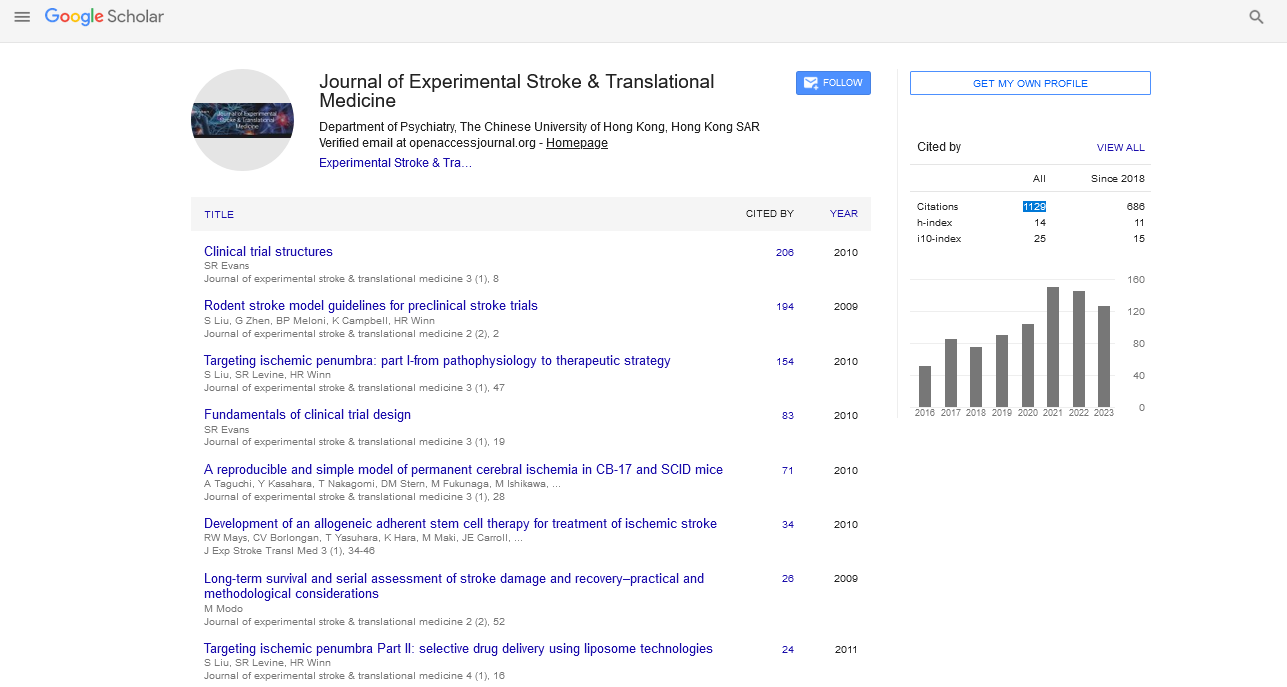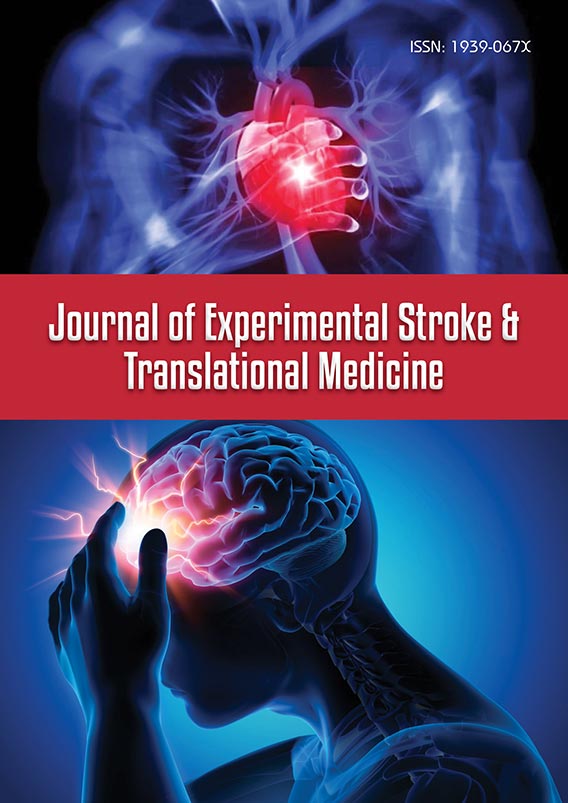Perspective - Journal of Experimental Stroke & Translational Medicine (2024) Volume 16, Issue 3
Harmonizing the Immune Orchestra: Navigating the Landscape of Immunomodulation
- Corresponding Author:
- Sten Cotun
Department of Immunology,
Vilnius University,
Vilnius,
Lithuania
E-mail: stenc@gmail.com
Received: 04-May-2024, Manuscript No. jestm-24-133992; Editor assigned: 08-May-2024, PreQC No. jestm-24-133992 (PQ); Reviewed: 22-May-2024, QC No. jestm-24-133992; Revised: 07-Jun-2024, Manuscript No. jestm-24-133992 (R); Published: 14-Jun-2024, DOI: 10.37532/jestm.2024.16(3).205-206
Introduction
In the intricate symphony of the human immune system, immunomodulation emerges as a conductor, orchestrating the delicate balance between protection and tolerance, immunity and inflammation. This dynamic process, governed by a complex interplay of cellular and molecular players, holds profound implications for human health and disease. In this comprehensive exploration, we embark on a journey through the realm of immunomodulation, unraveling its fundamental principles, therapeutic applications and potential for revolutionizing medical practice.
Description
Understanding immunomodulation
Immunomodulation encompasses a diverse array of strategies aimed at modifying the activity and function of the immune system to achieve desired therapeutic outcomes. At its core, immunomodulation involves the manipulation of immune responses to enhance host defense mechanisms against pathogens, suppress aberrant immune reactions in autoimmune diseases and modulate inflammatory processes in chronic conditions. This multifaceted approach leverages the intricate network of immune cells, cytokines, chemokines and signaling pathways that orchestrate immune responses throughout the body.
Key principles of immunomodulation
The principles of immunomodulation are rooted in the exquisite balance between activation and suppression of immune responses, finely tuned by a myriad of regulatory mechanisms. Central to this balance is the concept of immune tolerance, whereby the immune system distinguishes between self and non-self antigens, preventing autoimmune reactions against healthy tissues. Dysregulation of immune tolerance can lead to autoimmune diseases such as rheumatoid arthritis, multiple sclerosis and type 1 diabetes, underscoring the importance of immunomodulatory interventions in restoring immune homeostasis.
Therapeutic approaches to immunomodulation
Immunomodulation encompasses a diverse array of therapeutic approaches, ranging from conventional pharmacological agents to cutting-edge biologics and cell-based therapies. Pharmacological immunomodulators such as corticosteroids, Nonsteroidal Anti-Inflammatory Drugs (NSAIDs) and Disease-Modifying Antirheumatic Drugs (DMARDs) target specific components of the immune system to dampen inflammatory responses and alleviate symptoms in autoimmune and inflammatory diseases.
Biological agents such as monoclonal antibodies, cytokine inhibitors and immune checkpoint inhibitors offer targeted approaches to immunomodulation, blocking key immune pathways involved in autoimmune diseases, cancer immunotherapy and transplantation. These biologics selectively target immune cells or signaling molecules, modulating immune responses with precision and specificity while minimizing off-target effects.
Cell-based therapies, including adoptive T cell therapy, regulatory T cell therapy and mesenchymal stem cell therapy, represent a frontier in immunomodulation, harnessing the regenerative and immunoregulatory properties of cells to modulate immune responses and promote tissue repair. These innovative approaches hold promise for treating autoimmune diseases, inflammatory disorders and tissue injuries with unprecedented efficacy and precision.
Applications of immunomodulation
Immunomodulation finds applications across a wide spectrum of medical specialties, from rheumatology and dermatology to oncology, transplantation and infectious diseases. In rheumatoid arthritis, immunomodulatory agents such as methotrexate and Tumor Necrosis Factor (TNF) inhibitors have revolutionized the management of disease, reducing inflammation, preventing joint damage and improving patient quality of life. In cancer immunotherapy, immune checkpoint inhibitors such as PD-1 and CTLA-4 blockade have transformed the treatment landscape, unleashing the immune system’s ability to recognize and eliminate tumor cells.
In transplantation medicine, immunomodulation plays a pivotal role in preventing allograft rejection and promoting graft survival by suppressing immune responses against donor tissues. Immunosuppressive agents such as calcineurin inhibitors, mTOR inhibitors and antiproliferative drugs are used to modulate immune responses and prevent rejection in solid organ transplantation, while immunomodulatory therapies such as donor-specific antibodies and regulatory T cell infusions offer novel approaches to promoting transplant tolerance and minimizing the need for lifelong immunosuppression.
Challenges and future directions
Despite the tremendous promise of immunomodulation, significant challenges remain in translating basic research findings into effective clinical therapies. The heterogeneity of immune responses, the complexity of immune signaling pathways and the variability of patient responses present formidable obstacles to the development and implementation of immunomodulatory interventions. Moreover, the risk of off-target effects, immune-related adverse events and long-term complications underscores the need for careful patient selection, monitoring and surveillance in immunomodulatory therapy.
However, these challenges also present opportunities for innovation and advancement in the field of immunomodulation. Emerging technologies such as gene editing, RNA interference and CRISPR-Cas9 offer novel approaches to modulating immune responses with precision and specificity, enabling targeted interventions tailored to individual patient needs. Furthermore, advances in biomarker discovery, personalized medicine and predictive analytics hold promise for optimizing immunomodulatory therapies, identifying responders and nonresponders and maximizing treatment efficacy while minimizing adverse effects.
Conclusion
As we navigate the dynamic landscape of immunomodulation, we are confronted with the immense potential of harnessing the body’s own immune system to combat disease, promote healing and restore health. By unraveling the intricate mechanisms of immune regulation, developing targeted therapies and advancing personalized medicine approaches, we can revolutionize the treatment of autoimmune diseases, inflammatory disorders, cancer, transplantation and infectious diseases. Through interdisciplinary collaboration, translational research and a steadfast commitment to innovation, we can harness the power of immunomodulation to transform the future of medicine and improve the lives of patients worldwide.

